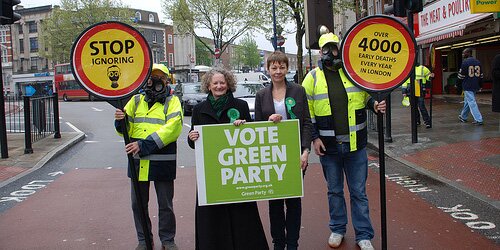Our Missed Deadline
9:30 pm - December 16th 2007
| Tweet | Share on Tumblr |
Predictably, the post-Bali conference fallout is one of claim and counter-claim. Is it a disappointing cop-out? A great day for the environment? The best that could be hoped for under the circumstances? I’ll leave this one to the multitudes who claim to be experts on this topic. What I am struck by though, is the increasing number of commentators who argue that whatever the deal reached in Bali, whatever action we take, we are too late to avoid a period of considerable climate change-related turmoil.
I was very disturbed by a recent article by well-regarded writer on climate change Ross Gelbspan. Gelbspan’s message is harsh in the extreme:
As the pace of global warming kicks into overdrive, the hollow optimism of climate activists, along with the desperate responses of some of the world’s most prominent climate scientists, is preventing us from focusing on the survival requirements of the human enterprise.
The environmental establishment continues to peddle the notion that we can solve the climate problem.
We can’t.
We have failed to meet nature’s deadline. In the next few years, this world will experience progressively more ominous and destabilizing changes. These will happen either incrementally — or in sudden, abrupt jumps.
Under either scenario, it seems inevitable that we will soon be confronted by water shortages, crop failures, increasing damages from extreme weather events, collapsing infrastructures, and, potentially, breakdowns in the democratic process itself.
Now in fairness Gelbspan is not arguing that we should do nothing. Rather, efforts to act on climate change can lay the groundwork for a new world system that would meet the considerable challenges we are facing:
To keep ourselves afloat, we need to change the economic and political structures that determine how we behave. In this case, we need to elevate the ethic of cooperation over the deeply ingrained reflex of competition. We need to elevate our biological similarities over our geographical differences. We need, in the face of this oncoming onslaught, to reorganize our social structures to reflect our most humane collective aspirations.
I don’t know how far to trust the bleaker climate change predications. Some other writers such as George Monbiot are more hopeful that there may be time – just – to avert disaster. What does seem to be clear though is that any response to climate change that requires radical action is doomed to fail. In the world in which we are living, any attempt to ‘reorganize our social structures to reflect our most humane collective aspirations’ has to contend with apathy, denial, awesomely powerful vested interests and the chaotic nature of global decision-making in a divided world of nation states. Perhaps radical change is possible, but I simply do not believe it is possible within the short window of opportunity that we have.
I think we have to concede that this is a battle that has been lost. What the consequences will be are not certain but it should be obvious that action to combat human-created global warming has been too little too late. Some of the brightest and best minds of our time have worked hard to deny that human activity creates climate change and to delay and weaken any response to global warming. They were better resourced, better organised and maybe even better motivated than those who fought for action against global warming.
Whilst we should still be fighting every step of the way to work on the ‘contraction and convergence’ agenda, we need to start to focus on the next environmental challenge – one that may still be winnable. We do not know yet what that challenge may be. We do know that on past behaviour, vested interests will deny and fight it with all their strength. The question is then: how can we work to change the political system so that a timely and appropriate responses to man-made environmental catastrophes are possible?
| Tweet | Share on Tumblr |  |
Keith Kahn-Harris is a regular contributor to Liberal Conspiracy. He is a research associate at the Centre for Urban and Community Research, Goldsmiths College and the convener of New Jewish Thought. Also at: Metal Jew and www.kahn-harris.org
· Other posts by Keith Kahn-Harris
Story Filed Under: Blog ,Environment
Sorry, the comment form is closed at this time.
Reader comments
It strikes me as obvious that the longer we leave the problem unaddressed the greater the mayhem. If it is an unwritten strategy to allow this to occur (as has been the case by some governments) then this is both malfeasance and human rights abuse on a grand scale. it is not that there is a lack of evidence rather a lack of will to prosecute this idiocy. Ignorance, negligence, and ‘failure to take care’ come to mind. All are culpable. The only thing that prevents me from endorsing a prosecutorial approach (via the court of human rights) is that is may be a distraction from the work that is necessary to ameliorate that which is broken, either way, while the dunderheads who have stymied a precuationary approach for so long deserve an arse kicking – it will be people power that is required to ensure they are roundly ignored. SIMPOL is necessary and required now…. for only by this consensus can there be a framework and mechanism to “how can we work to change the political system so that a timely and appropriate responses to man-made environmental catastrophes are possible?”
see
Ross is a veteran and much respected for his long struggle to keep the reality of climate change ahead of the rhetoric around it.
His challenge, that it is already to late, puts us all on the spot because in writing this piece he is formally changing his position and citing much evidence to back up this decision.
Can we solve the problem faster than we are creating it? This is ‘the battle of the rates’.
It helps to resolve this challenge with reference to the actual numbers [rates of contraction and convergence - C&C] that are relevant.
As shown here, it incorporates the latest coupled modelling of the Hadley Centre as published in the IPCC AR4: –
http://www.gci.org.uk/Animations/BENN_C&C_Animation_Tower_&_Ravens.exe
Variously described as: –
“brilliant and scary”,
“awesome”,
“very beautiful and very instructive”
it gives nonetheless the numerate but painful truth of our climate change dilemma and what it takes to beat the battle of the rates.
Rates of C&C that are still relevant sadly don’t provide the amount of time that is needed to conduct all the fruitless allopathic argument that academics, bureacrats and [even still] some campaigners imply is still available and still needed for the detailed arguments they still make.
Aubrey Meyer
GCI
The key difficulty is that Ross wants us to depart from the kind of analysis buried in economics, but that is the dominant analysis of our times and it’s hard to see that happening.
The key problem with market solutions was summed up by Amartya Sen, referring to food supplies: “famine is a market solution to food shortage.”
And so with climate change, widespread death and destruction is a market solution to the problems of climate change. Avoiding that requires departing from market solutions, but it’s hard to see how we have (even now) either the evidence or the persuasive narrative to create a shift of those proportions.
. . . which [in response to the dark and dangerous comment by Meh] explains why Colin Challen MP [Chair of the All Party Parliamentary Group on Climate Change in the UK House of Commons] likened it to the, “economics of genocide”.
The real difference however is that ‘genocide’ – as an ‘economic externality’ – is obvioulsy the prelude to something much worse – conflict and overall failure to prevent dangerous rates [runaway rates] of climate change. True – some people die in a famine. The point now is all of us are vulnerable to runaway rates of climate change.
Even Sir Jock Stirrup [RAF top-man] lectured in Whitehall to climate-change bureacrats saying that Osama bin Laden ‘had a point’ [about the George Bush refusal to get serious about climate change] and that the military was not up to managing the security implications of runaway climate change.
Nicholas Stern described climate change as the biggest market-failure in history. To me his analysis under-reads the seriousness of the situation we are going into which is why his economic prescriptions are so frail – we can make it all go away for one percent of GDP.
Mega-Extinction events have happened before [Permian], without the trigger of fossil fuel combustion.
After the conference one of the first things I said to friends was that getting the US on board, even without targets, is a success for the future. This only goes to make me feel better for denouncing the strict need for targets that campaigners and organisers were hoping for.
If we are truly past the point of no return and are now playing a game of damage limitation, then targets that create “sides” in what should be a global co-operative movement, and help to create an environment of fingerpointing rather than problem solving, are not going to get us to where we need to be going very fast.
If the outcome of the Bali conference is that people feel more comfortable to work together then this is a positive step forward…because let’s face it, even if the US was on board with Kyoto it would have missed its targets just like the rest of us and we’d still be sitting here looking at an article by Ross Gelbspan telling us we’re too late.
The time for the blame game really is over now, it’s time for environmentalists and politicians alike to mature a little on this subject.
I am sorry to admit that I have no idea who Ross Gelbspan might be, but it seems to me that people like Monbiot really want disaster to strike.
They would revel in it.
Reactions: Twitter, blogs
Sorry, the comment form is closed at this time.
NEWS ARTICLES ARCHIVE





















